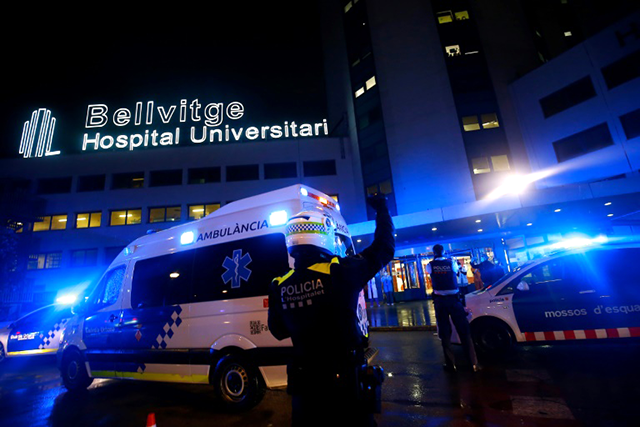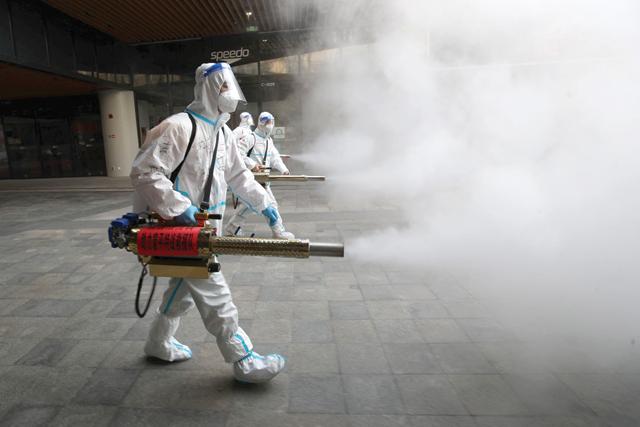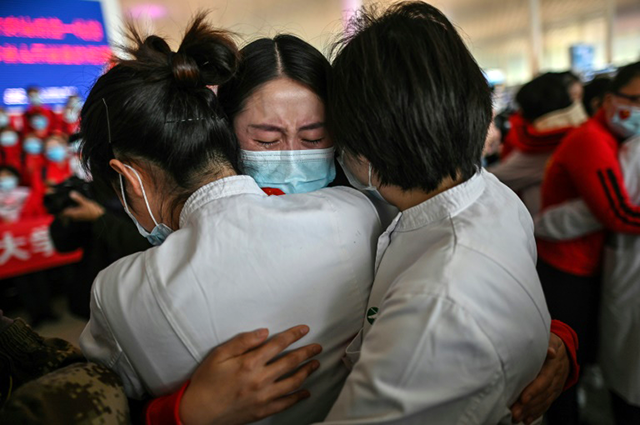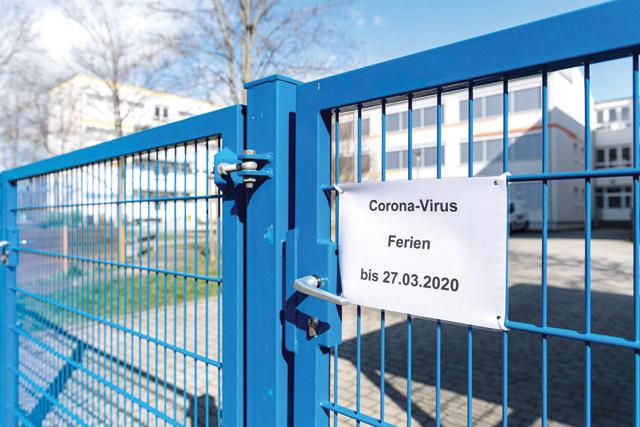You are here
Global emergency efforts ramp up as pandemic deaths soar
By AFP - Mar 23,2020 - Last updated at Mar 23,2020

Police and other security forces gather outside the Bellvitge hospital near Barcelona to applaud and cheer healthcare workers (AFP photo)
PARIS — Global emergency efforts to slow the coronavirus pandemic ratcheted up on Monday with more nations and cities imposing extraordinary lockdowns, as the death toll topped 15,000 and more than one billion people were confined to their homes.
From Germany banning gatherings of more than two people, Italy banning travel, New Zealand announcing a four-week lockdown and Hong Kong shutting its borders to all non-residents, the new round of containment efforts highlighted a deepening sense of panic around the world.
According to an AFP tally, more than one billion people around the world have now been asked to stay home in line with mandatory or recommended measures rolled out by governments scrambling to slow the tide of the deadly pandemic.
The Tokyo Olympics due to start in July looked increasingly likely to be postponed, with Canada pulling out and Australia saying it was preparing for a one-year delay.
World Athletics chief Sebastian Coe joined calls for the Games to be postponed after Japan's prime minister admitted a delay could be "inevitable".
In the United States, President Donald Trump ordered thousands of emergency hospital beds to be set up at coronavirus hotspots as a trillion-dollar economic rescue package crashed in the Senate.
"We're at war, in a true sense we're at war," Trump said.
'Necessary measures'
The death toll from the virus surged to more than 15,000, according to an AFP tally on Monday, with Europe the new epicentre of the outbreak that first emerged in China late last year.
Italy's world-worst toll from the pandemic approached 5,500 with another 651 deaths reported on Sunday, a day after it surpassed China with the highest number of fatalities.
European nations continued to choke people's movement, with Greece the latest nations to follow Italy, Spain and France in imposing a nationwide lockdown.
City streets in Greece normally packed with Monday morning traffic were suddenly deserted as residents stayed inside -- leaving the house only for essential trips as long as they carried a document declaring their outings.
"It's a bit of a hassle... but these measures are necessary and we'll get used to them," said Athens resident Maria Bourras, who leaves her house regularly to walk her dog.
In Germany, Chancellor Angela Merkel on Sunday announced the ban on gatherings of more than two people. She did so while in quarantine herself because she had met an infected doctor.
Brits on the beach
Italy banned travel and shut down a range of industries and businesses on Monday, a new wave of restrictions designed to get the country through a vital 10-day stretch in which the rate of deaths and infections is supposed to finally drop.
Spain's prime minister said he would ask parliament to extend a 15-day state of emergency, which bars people from leaving home unless absolutely essential, until April 11.
Spain reported another spike in fatalities Monday, bringing its total to 2,182 dead -- the third highest in the world after Italy and China.
Residents across France, where the death toll jumped to 674, also remained shut in their homes.
A curfew was imposed in some regions and the mayor of Paris called for even more drastic confinement measures in a city under lockdown.
Meanwhile Britain inched towards similar measures as Prime Minister Boris Johnson warned the country was a couple of weeks behind registering similar numbers to Italy.
Johnson is under pressure to ramp up restrictions after crowds flocked to holiday hotspots and beaches at the weekend, defying social distancing recommendations.
Great Depression fears
In the United States, more than a third of Americans were under various forms of lockdown, including in New York, Chicago and Los Angeles, but the number of infections nationally has continued to climb.
Highlighting the desperation in the world's biggest economy, the mayor of New York said his city was just 10 days away from running out of ventilators.
And a trillion-dollar Senate proposal to revive the US economy failed Sunday after receiving zero support from Democrats, further traumatising investors who are watching stock markets implode worldwide.
Asian markets were hammered on Monday, and European stocks dropped four percent at the open before coming off their worst levels at midday.
The economic fallout from the virus has sparked fears of a global slump not seen for decades.
"This is the biggest economic shock our nation has faced in generations," Australian Prime Minister Scott Morrison said as he warned the pandemic could lead to a crisis akin to the 1930s Great Depression.
Moral burden
As the pandemic overwhelms hospitals, doctors are having to quickly prioritise patients based on their chances of survival, inflicting a huge moral burden.
"We go into medicine to heal people. Not to make choices about who can live," said Philippe Devos, an anaesthesiologist in Belgium.
The virus emerged in China in December, after first being detected at a market that sold wild animals for human consumption in the central city of Wuhan.
China has since sought to sow doubts over whether the virus began in Wuhan, while portraying itself as a saviour in the global fight and a role model for quarantines.
On Monday it reported no new local cases of the virus -- but confirmed another 39 infections from overseas -- while life slowly started returning to normal in Wuhan with people heading back to work and public transport resuming.
But Beijing's communist leaders have been criticised at home and abroad for a perceived lack of transparency, particularly at the start of the outbreak.
Second wave
There are fears across Asia of "imported" cases from Europe and other hotspots.
New Zealand has yet to be hit hard but on Monday announced a four-week lockdown to prevent a Europe-style crisis, with Colombia set to follow suit on Wednesday.
Hong Kong, which had largely avoided the virus in the first wave despite being so close to the Chinese mainland, announced a ban on all non-residents from entering.
Some 8,600 restaurants and bars with a licence will also be banned from selling alcohol but will, for now, be allowed to remain open.
The new measures were supported by some, after images of foreigners crowding bars sparked anger in the city.
"They have this attitude of 'Well, I'm ok, so not sure I need to.' That to me is really dangerous," bar owner Gary Stokes told AFP.
"These expats decided to run when they didn't like what was going on in Hong Kong, and then when it ends up in their countries they run back again," he said.
Related Articles
COPENHAGEN — More than half of people in Europe are projected to catch Omicron in the next two months, the World Health Organisation (WHO) s
BEIJING — Voicing joy and excitement from behind face masks, tens of thousands of people fled Wuhan on Wednesday after a 76-day travel ban w
GENEVA — The World Health Organisation declared Europe the new epicentre of the coronavirus on Friday as countries across the globe sealed b



















